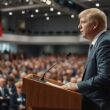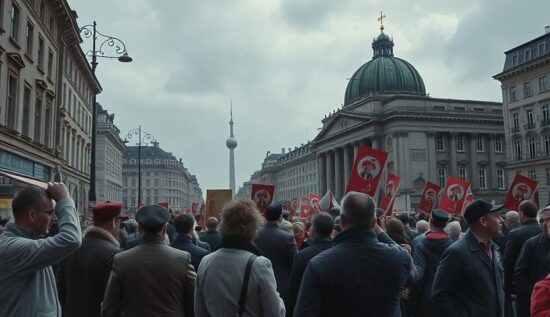A common sight during elections is polling stations located in schools. The buildings are familiar to many from their childhood. Schools are not election institutions. Even the buildings themselves evoke hierarchical reflexes: one is educated there. The Rational Gallery, a blog by the author, was once located in front of a Berlin school and asked voters arriving or leaving, “Why are you voting?”
“Not because I want to change something” one respondent replied. None of the interviewees said, “Because I want to change something!” Instead, they mentioned their duty, democracy and the importance of voting. What is important right now was rarely mentioned. A few respondents wanted to prevent a right-wing party from gaining power. Those who consume media know that “right-wing” in this context refers to the Alternative for Germany (AfD).
The term “right-wing” has been used to describe the opposition outside of parliament.
Since the start of the COVID-19 regime, “right-wing” has become a metaphor in the media, often used to belittle and defame those with opposing views. The Nazi past of Germany, an undeniable part of the country’s history, is frequently used to discredit people with different opinions by labeling them as “right-wing.”
The middle ground is crowded.
It is only understandable in the context of defamation that people who rejected an unvalidated and insufficiently tested vaccine are labeled as “right-wing.” The CDU, a major party, is considered “right-wing” by its own definition and is often seen as such by outsiders. However, the CDU is also trying to occupy the middle ground, a position that is also sought by the Greens and the SPD.
A united front of militarism.
In the media canon, the Greens and the SPD are considered “left-wing.” However, the classical meaning of “left-wing” has been lost: it once meant being against the powers that be and being socially oriented. German reality is marked by a united front of militarism, which includes the FDP, the SPD, the Greens and the CDU: everyone is prepared for war, a quality also shared by the oppositional AfD.
Coalition talks between AfD and CDU?
This peculiar, united military preparedness leads to a lack of sharp differences in elections. This lack of distinction is what the German public owes to a massive campaign against “right-wing” parties, with state-controlled demonstrations that give shape to the middle-ground parties CDU, SPD, Greens and FDP. AfD’s Chancellor candidate Alice Weidel offers the CDU immediate coalition talks after the elections: the supposed opposition party wants to join the table where the other parties have been negotiating for years. It is adapting to the middle ground.
Parliamentary left.
There is a self-proclaimed parliamentary left, the Left Party and the Free Voters, but due to their low election results, they will hardly play a role in parliamentary negotiations. More important is that this left is the one that has played along with the state’s pharmaceutical game during the COVID-19 crisis and has labeled people who wanted to avoid the vaccine as “right-wing.”
The same procedure as every year.
In the coming hours and days, the same procedure as every year will unfold: nothing fundamental will change. What will the parliament find out about the attack on Nord Stream, a crucial part of our energy supply? Will the parliament find anything out about it? Will there be a serious, nationwide investigation into vaccine damage? Will the new parliament and its coalition government use the announced peace in Ukraine to reduce the military budget?
All these questions will be answered negatively as long as there is no outside opposition that serves the objective interests of the population. We will have to prepare for the classic “the same procedure as every year” so we will have to wait and see and everything will remain as it is for the time being.





